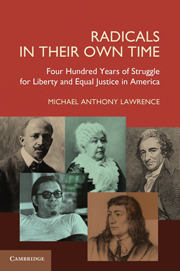Book contents
- Frontmatter
- Contents
- Illustrations
- Acknowledgments
- Introduction
- 1 Roger Williams (1603–1683): Freeborn
- 2 Thomas Paine (1737–1809): Revolution
- 3 Elizabeth Cady Stanton (1815–1902): Gender Wars
- 4 W. E. B. Du Bois (1868–1963): American Apartheid
- 5 Vine Deloria Jr. (1933–2005): Betrayals and Bridges
- Notes
- Index
Introduction
Published online by Cambridge University Press: 05 June 2012
- Frontmatter
- Contents
- Illustrations
- Acknowledgments
- Introduction
- 1 Roger Williams (1603–1683): Freeborn
- 2 Thomas Paine (1737–1809): Revolution
- 3 Elizabeth Cady Stanton (1815–1902): Gender Wars
- 4 W. E. B. Du Bois (1868–1963): American Apartheid
- 5 Vine Deloria Jr. (1933–2005): Betrayals and Bridges
- Notes
- Index
Summary
America in the twenty-first century exists in a perpetual Dickensian sort of best-of-times-worst-of-times state when it comes to putting into practice the sacred principles of liberty and equal justice. On the one hand, the once unthinkable occurred in November 2008, when the nation – a land that had permitted and promoted human slavery for more than half of its four-hundred-year history – elected an African American man president. The symbolic importance alone of placing Barack Obama at the pinnacle of power in the United States, given its sordid past practices, cannot be overstated. On the other hand, on the very same day, a majority of voters in the most populous state in the union, California, voted to deny thousands of their fellow citizens, gay Americans, the equal right to marry. The California experience is only one of numerous legislativejudicial struggles beginning to play out on the issue of gay marriage in other states around the nation.
Taking the long view, if history is any guide (and it is), there is little doubt that the discriminatory laws against gay marriage will eventually end up on history's scrap heap. The current battles will soon go the way of those of some fifty years ago involving interracial marriage, during which one Virginia trial court, in upholding the state's antimiscegenation statute, reasoned: “Almighty God created the races white, black, yellow, malay and red, and he placed them on separate continents.
- Type
- Chapter
- Information
- Radicals in their Own TimeFour Hundred Years of Struggle for Liberty and Equal Justice in America, pp. 1 - 14Publisher: Cambridge University PressPrint publication year: 2010



